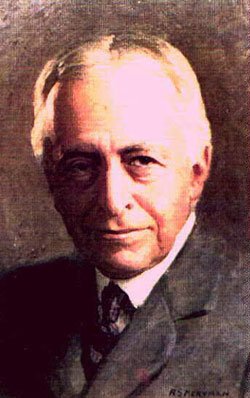Irving Babbitt’s Humanist Critique of Romantic Modernism
Amanda Reichenbach, Irving Babbitt, Modernism, Romanticism, Scientism
Amanda Reichenbach, a recent graduate of Yale, has an excellent essay in National Review on the now-almost-forgotten humanist Irving Babbitt’s critique of Modernism.
Babbitt reacted against what he regarded as the twin evils of the modern era: Romanticism and utilitarian scientism. … Babbitt did not see them as opposed forces. Rather, they worked in concert to reduce humans — complex, multi-dimensional beings — to cardboard cutouts incapable of moral choice.
Babbitt’s fundamental view of the human condition was that the “higher will†waged a lifelong, internal “civil war in the cave†against the “lower will.†Modernity, he believed, tended to collapse the distinction between the two wills. That “man is naturally good and that it is by our institutions alone that men become wicked†is, he thought, the most dangerous belief, found in Rousseau’s Confessions. It replaces the true dualism of the “civil war in the cave†with dualism between man and society.
This individual who sees liberty in the ability to follow every whim — someone whom Deneen would call a liberal, and Babbitt a Romantic — is drawn to a sentimental libertinism in which indulgent emotion is elevated over the hard work of becoming a good person. The Romantic wishes to see destroyed any laws and customs that might prevent him from doing all that his heart desires.
When human passions are released, however, writes Babbitt, “what emerges in the real world is not the mythical will to brotherhood, but the ego and its fundamental will to power.†The will to power often presents itself in palatable ways, replacing traditional notions of virtue with what Babbitt calls “a sort of parody of Christian charity.†The Romantic is drawn not to humanism but to emotional humanitarianism. Believing himself to be blameless, the Romantic locates the source of society’s evils in everybody else. The Romantic humanitarian, Babbitt argues, will always go around pointing out the specks in his neighbors’ eyes while a plank burdens his own. Rousseau, the chief example of this tendency, wrote a 500-page book on how to raise and educate children, after leaving five of his own to a foundling hospital.
The Romantic soon discovers that a lack of restraint is a sure recipe for loneliness, though he has been promised emotional communion with his fellow beautiful souls. When he finds that his philosophy is based on Arcadian unreality, his disillusion leads him to “drift towards a naturalistic fatalism.†Babbitt argues that the rise of science and sociology teaches man that he is entirely a product of his circumstances and incapable of individual moral improvement. Here, too, the lines are not drawn between what is good and what is bad within each human, but between the individual and the society that conditions him. Given the twin influences of Romanticism and scientism, Babbitt feared, “man is in danger of being deprived of every last scrap and vestige of his humanity,†since he “becomes human only in so far as he exercises moral choice.â€
A must-read.






